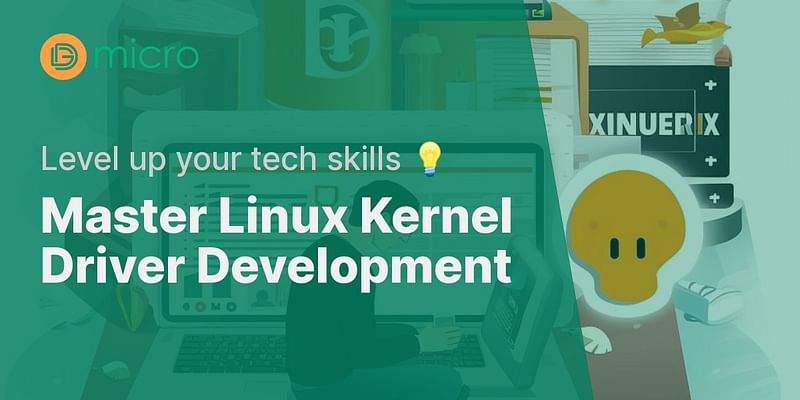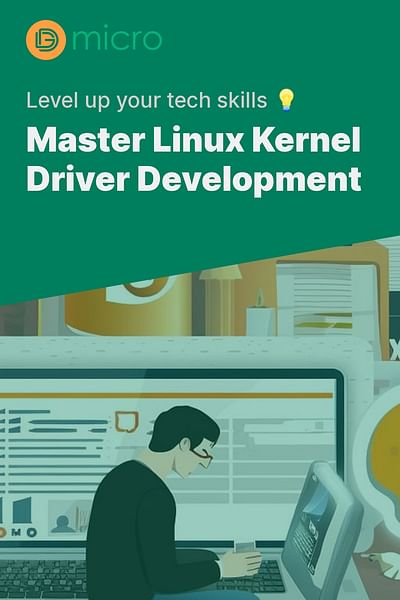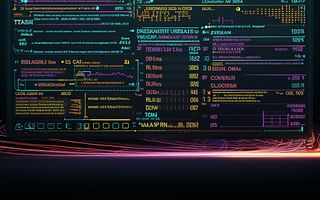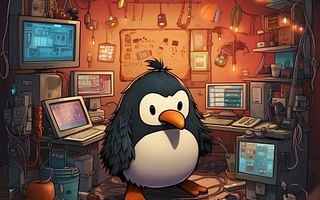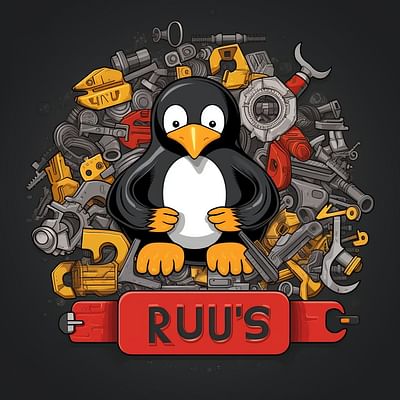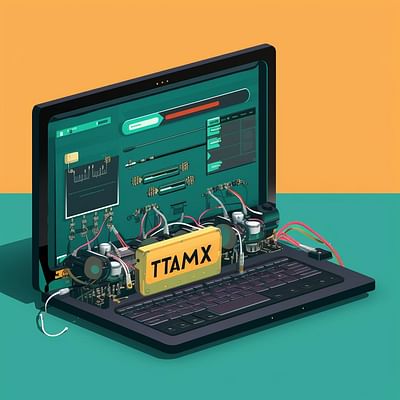Hannah Morton is a Linux enthusiast and a software engineer. She has been working with Linux systems for over a decade. Hannah enjoys sharing her knowledge and helping others learn and grow in the field.
Embarking on the journey to learn Linux kernel programming is a significant step in any developer's career. The Linux kernel is the heart of any Linux system, and understanding its inner workings can open up a world of opportunities. Kernel driver development, in particular, is a specialized area of Linux programming that allows you to interact directly with the hardware, making it a crucial skill for system-level programmers. If you're interested in learning more about the Linux kernel, check out these recommended tutorials.
But why should you learn Linux? Isn't it notoriously hard to learn? Well, Linux is a powerful, open-source operating system that powers servers, desktops, and even mobile devices worldwide. Its versatility, efficiency, and the vast community support make it an excellent choice for developers. And while it may seem daunting at first, with the right resources such as Linux tools like Rufus and Oracle Linux and a bit of persistence, you'll find that it's not as hard as it seems.
Whether you're looking for the best Linux tutorial or wondering about the best place to learn Linux, you're in the right place. In the following sections, we'll explore some of the best Linux learning resources for kernel driver development, including books, online courses, and communities. For a comprehensive learning experience, consider joining the Linux Academy. So, are you ready to dive into the world of Linux kernel driver development?
🚀 Let's Dive In: Top Resources to Master Linux Kernel Driver Development
Comprehensive List of Top Resources for Mastering Linux Kernel Driver Development
- Books: Start with the basics and delve deeper into the world of Linux kernel driver development with books like 'Linux Device Drivers' by Jonathan Corbet, and 'Linux Kernel Development' by Robert Love.
- Online Courses: Platforms like Udemy, Coursera, and edX offer comprehensive courses on Linux kernel driver development. Some recommended ones are 'Linux Kernel Programming' and 'Writing Device Drivers in Linux'.
- Communities and Forums: Engage with like-minded individuals and experts in communities like Stack Overflow, Linux Kernel Newbies, and Reddit's r/linux. These platforms offer invaluable insights, discussions, and problem-solving opportunities.
- Documentation: The Linux kernel documentation is an exhaustive resource that provides a wealth of information about kernel driver development. It's a must-read for anyone serious about mastering this field.
- YouTube Channels: Channels like 'The Linux Channel' and 'Kernel Programming' provide visual learners with a wealth of tutorials and explainer videos on Linux kernel driver development.
- GitHub: Open-source projects on GitHub related to Linux kernel driver development can provide practical examples and real-world scenarios to learn from. It's a great way to see how others are solving problems and to contribute to projects.
📚 Page-Turners: Essential Books for Your Linux Kernel Programming Journey
Embarking on your journey to learn Linux kernel programming, especially Linux driver development, can be an exciting yet challenging endeavor. But don't worry, there are some excellent resources to guide you.
"Linux Device Drivers" by Jonathan Corbet, Alessandro Rubini, and Greg Kroah-Hartman is a classic. This book provides a detailed and comprehensive guide to writing your own drivers, with practical examples. It's a must-read if you're serious about Linux kernel driver development.
Another gem is "Linux Kernel Development" by Robert Love. This book offers an in-depth look at the Linux kernel, including its design and implementation, making it a great resource for those who want to delve deeper into the heart of the Linux operating system.
For those who prefer a more hands-on approach, "Writing Linux Device Drivers: a guide with exercises" by Dr. Jerry Cooperstein is an excellent choice. It provides practical exercises that will help you get your hands dirty with actual driver code.
Remember, the best way to learn is by doing. So, pick up a book, dive into the code, and start your Linux kernel programming adventure today!
💻 Virtual Classrooms: Online Courses to Fast-Track Your Linux Driver Development Skills
When it comes to online courses, there's a wealth of resources to help you learn Linux kernel programming. One standout platform is Udemy. Their course, "Linux Kernel Driver Development", is an in-depth tutorial that guides you through the process of creating your own drivers. The instructor's hands-on approach ensures you'll get practical experience, which is invaluable when learning such a complex subject. You can also check out some of the best Linux tutorials available online to complement your learning.
Another fantastic resource is Linux Foundation’s Training Program. Their course, "Developing Linux Device Drivers", is a comprehensive guide to Linux driver development. Taught by seasoned professionals, it's a great way to get industry-standard training. You may also want to explore recommended textbooks or online resources for learning Linux programming.
Ever wondered why learn Linux? Well, Coursera’s "Linux Kernel Programming" course can answer that for you. It covers the basics of kernel development and then dives into more advanced topics. This course is a great starting point for those who are new to kernel programming.
Remember, the best place to learn Linux is one that suits your learning style and pace. So, explore these courses, and find the one that's right for you. You can start by checking out the best place to start learning about Linux for beginners. Happy learning!
👥 Join the Crowd: Communities and Forums for Peer-to-Peer Linux Learning
Communities and forums are an invaluable resource when you're looking to learn Linux kernel programming and dive into Linux driver development. They provide a platform for peer-to-peer learning, where you can ask questions, share knowledge, and get feedback from people who are on the same journey. They're also a great place to stay updated on the latest trends and developments in the Linux world.
One of the most popular communities is Stack Overflow. It's a treasure trove of information, with thousands of questions and answers on Linux kernel driver development. Whether you're stuck with a specific problem or just curious about a certain topic, chances are you'll find what you're looking for.
Another fantastic community is Linux Kernel Newbies. As the name suggests, it's a welcoming space for beginners, offering tutorials, guides, and a mailing list where you can connect with other newbies and experienced developers alike. It's the best place to learn Linux if you're just starting out.
Remember, learning is a journey, not a destination. It's okay to ask questions, to make mistakes, and to ask for help. That's how we grow. So, are you ready to dive into the world of Linux kernel driver development?
Example of a Simple Linux Kernel Driver
Let's take a look at a simple example of a Linux kernel driver. This is a basic 'Hello, World!' driver. It doesn't do much, but it's a good starting point to understand the structure of a Linux driver. This code is written in C, which is the primary language for Linux kernel development.
#include
#include
#include
MODULE_LICENSE("GPL");
MODULE_AUTHOR("Your Name");
MODULE_DESCRIPTION("A simple Linux driver for beginners");
MODULE_VERSION("0.1");
static int __init hello_init(void) {
printk(KERN_INFO "Hello, World!\n");
return 0;
}
static void __exit hello_exit(void) {
printk(KERN_INFO "Goodbye, World!\n");
}
module_init(hello_init);
module_exit(hello_exit);
In this code, we first include the necessary header files. Then we define some information about the module (like its license and author) using MODULE macros. The 'hello_init' function is called when the module is loaded into the kernel, and 'hello_exit' is called when it's removed. The 'printk' function is used to print messages to the kernel log, which can be read with the 'dmesg' command. This is a very basic example, but it serves as a good starting point for understanding Linux kernel driver development.
🛠️ Your Toolkit: Practical Tips to Kickstart Your Linux Kernel Driver Development Adventure
Embarking on the journey to learn Linux kernel programming can seem daunting, but remember, every expert was once a beginner. Start small, perhaps by understanding a simple Linux driver development tutorial, and gradually dive deeper. Don't be intimidated by the complexity of the Linux kernel; instead, embrace it as a challenge.
As you explore the best Linux learning resources, remember to balance theory with practice. Reading about Linux kernel driver development is essential, but applying what you learn through hands-on projects will solidify your understanding. And don't worry if you hit roadblocks - that's part of the learning process. Seek help from online communities like Stack Overflow or Linux Kernel Newbies where seasoned developers are often eager to lend a hand.
Is Linux hard to learn? It can be, but it's also immensely rewarding. As you learn Linux online, you'll unlock new potentials and open up a world of opportunities. So, why learn Linux? Because it's a skill that will always be in demand in the tech industry.
Remember, the best place to learn Linux is wherever you feel most comfortable and motivated. So, start your Linux learning online today and take the first step towards mastering Linux kernel driver development. You've got this!

